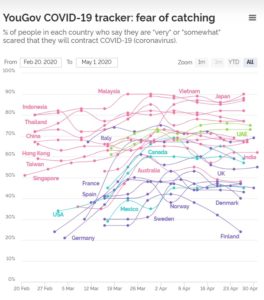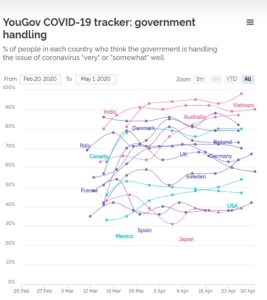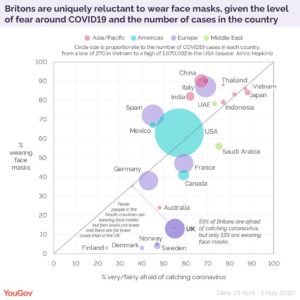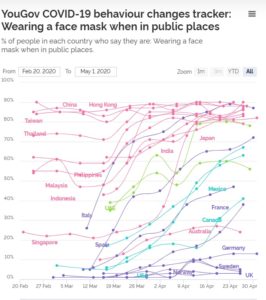YouGov’s International COVID-19 Tracker Shows Consistent Fear Levels Across The 26 Surveyed Countries
Once again fear levels have remained largely consistent across the 26 territories covered by YouGov’s international COVID-19 tracker. The largest shift has taken place in Finland, where the proportion of people who are very or fairly scared they will catch coronavirus has fallen from 32% to 24%. Denmark also experienced a seven-point drop, to 40%, while Canada saw a six-point decrease to 59%.
The largest increase in fear, such as it is, took place in Vietnam, where the current level of 90% is four-points higher than it was last week.
In the UAE and KSA, the level of fear has been consistently stable over the past few weeks ever since residents started restricting their movement following the stay at home guidelines in the UAE or the 24-hour lockdown in some of the major cities in KSA.

Behaviour
The most notable changes in behaviour this week include:
- In Denmark the proportion of people who are avoiding going to work fell 16-points to 32%, and the number saying they are avoiding contact with tourists feel 17-points to 39%.
- In Germany the number of people wearing face masks has jumped 14-points to 38%, while Canada has also seen a ten-point increase to 41%.
- In Sweden there has been a 10-point increase in the number of people saying they are avoiding crowded places
Government support
There continue to be few countries where people tend to think the government is handling the crisis badly: Japan, France and Spain. Americans are evenly split, with 47% apiece thinking the government is doing well/badly. In all other countries the public are much more likely to think their rulers are tackling the crisis well than badly.

The largest changes this week have taken place in Scandinavia: Sweden has seen a seven-point boost in the number of people thinking the government is doing well, to 64%, while Denmark has seen a six-point drop, to 82%.
Britons seem uniquely reluctant to don face masks
At a press conference on Thursday prime minister Boris Johnson said face masks will be “useful” as part of coming out of lockdown. This sets him at odds with comments made by his own health minister just two days before, who had said there was only “weak science” supporting advice that people should wear face coverings.
Our tracker has found Britons to be consistently unlikely to have put on protective facewear, and when accounting for levels of fear of catching coronavirus along with the number of Covid19 cases in the country, seem uniquely so compared to other countries.
In most countries the number of people wearing face masks when out in public correlates with the proportion of people who are afraid of catching the disease.

In the UK, however, 55% of Britons say they are very or fairly afraid of catching coronavirus, but only 13% say they are wearing face masks.
Only in Scandinavia is face mask usage comparably low, at 3-5%. However, there have also been far fewer coronavirus cases in these countries: between 5,000 and 21,000 compared to the UK’s 172,000.
While the British prime minister’s call has not spurred an uptake in face mask usage – the 13% figure is the same as it was the week before – there has been an increase in the number of Britons saying that the government should be providing such masks for free, up ten-points to 42%.
In the early days of YouGov’s COVID19 tracker, Britons were hardly unusual among Western nations in going about their business barefaced. However, since that point the numbers of people wearing masks in other countries have risen sharply, leaving only Britons and Scandinavians the only ones for whom wearing a face mask is still uncommon practice.








 Email: info@cyber-gear.com
Email: info@cyber-gear.com